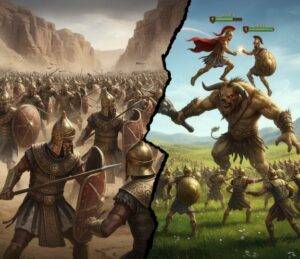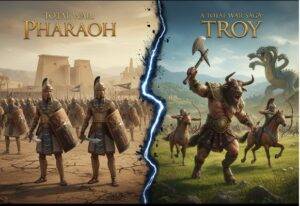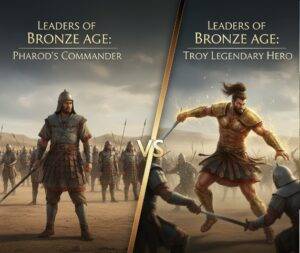10 Epic Games Like Total Annihilation That Will Reignite Your RTS Passion
The Bronze Age is collapsing, empires are turning to dust, and two of the era’s greatest conflicts call for a leader. You’re standing at a crossroads, staring at two formidable Total War titles: the historically-grounded Total War: Pharaoh and the myth-infused A Total War Saga: Troy. Both promise epic battles and sprawling campaigns, but their design philosophies are worlds apart. This guide will serve as your strategic advisor, breaking down the critical Total War: Pharaoh vs Troy debate so you can invest with confidence and avoid buyer’s remorse.
As a long-time veteran of this franchise, I’ve spent hundreds of hours navigating the shifting sands of Egypt and the contested shores of the Aegean. My goal is to move beyond the store descriptions and give you a clear-eyed look at how these games actually play, what they do best, and ultimately, which one is the right choice for you.
The Core Comparison: Total War Pharaoh vs Troy
Let’s start with a high-level overview. This table gives you a quick, digestible breakdown of the most critical differences between the two games.
Campaign & Setting: A Clash of Visions
While both games are set in the Bronze Age, their approach to the campaign map is fundamentally different.
- Pharaoh is a game about survival. The entire campaign is built around the “Pillars of Civilization” mechanic. As cities are razed and armies fall, civilization itself begins to crumble, bringing plagues, rebellions, and the devastating Sea Peoples invasions. Your goal isn’t just to conquer, but to hold the world together. The dynamic weather system, with its suffocating sandstorms and tide-altering downpours, makes the map itself a character and a constant tactical consideration. It feels heavy, atmospheric, and desperate.
- Troy is a game about logistics and legend. Its masterstroke is the multi-resource economy. You constantly need to balance your income of food, wood, stone, bronze, and gold, forcing you to make strategic decisions about which settlements to capture and which trade deals to make. It’s a brilliant system that makes every region of the map feel valuable. The Divine Will system, where you curry favor with gods like Ares or Apollo for powerful buffs, adds a fantastic layer of strategic choice that ties directly into the mythological theme.
Combat & Rosters: History vs. Myth
On the battlefield, the games reveal their true colors. This is perhaps the most significant point of divergence and will likely be your deciding factor.
Is total war pharaoh worth it?
If you crave a more tactical, “historical” Total War experience, the answer is a resounding yes. Pharaoh’s combat is a gritty, infantry-centric affair. The battles feel weighty and deliberate. Chariots are devastating, but the core of your army will be carefully positioned lines of spearmen, axemen, and archers. The armor degradation system means that even the most elite units can be worn down in a protracted fight, making flanking and cycle-charging more important than ever.
The common criticism is its perceived lack of unit variety, especially when compared to a title like Warhammer. However, this is by design. The value here comes from the nuanced differences between unit roles rather than flashy monsters. It’s a thinking person’s battlefield that rewards sound tactics over brute force.
Mythos vs Truth Troy Total War
Troy brilliantly solves the problem of depicting a mythological war by giving you three distinct ways to play:
- The Truth Behind the Myth (Standard): This is the default mode. Mythological creatures are represented by creatively designed human units. The Minotaur is a giant, shirtless warrior wearing a bull’s skull, and Centaurs are skilled skirmisher cavalry. It’s a plausible, historical take on the legends.
- Mythological Mode (Mythos DLC): This mode goes all-in on the fantasy. The Minotaur is a literal beast, Hydras regenerate on the battlefield, and Griffins swoop from the sky. It pushes the game much closer to Total War: Warhammer and is a fantastic experience for those who love fantasy elements.
- Historical Mode: This mode strips out all single-entity hero units and myth-inspired troops, offering the most grounded experience possible. Heroes become standard general’s bodyguards.
This flexibility is one of Troy’s greatest strengths. Your combat experience is defined by the larger-than-life heroes like Achilles and Hector, who can duel enemy leaders and carve through entire units. It’s spectacular, fast-paced, and hero-focused.
Final Verdict: Who Should Buy Pharaoh, and Who Should Buy Troy?
Having laid out the evidence, the final recommendation comes down to your personal taste as a strategy commander. There is no single “better” game, only the game that is better for you.
➡️ Buy Total War: Pharaoh if:
- You are a historical purist who prefers a grounded, realistic setting.
- You love deep, complex campaign mechanics and managing an empire on the brink of collapse.
- You enjoy deliberate, tactical, infantry-focused battles where positioning and army composition are key.
- The idea of battling sandstorms and holding civilization together against a tide of invaders excites you.
➡️ Buy A Total War Saga: Troy if:
- You enjoy mythological elements and the spectacle of epic heroes clashing.
- You are intrigued by a unique multi-resource economy that adds a new strategic layer to the campaign.
- You prefer faster-paced, hero-centric battles where a single unit can change the course of a fight.
- You want a “complete” package with a large amount of DLC content and the flexibility to play in historical or full fantasy modes.
Ultimately, Pharaoh is a finely crafted historical simulation, while Troy is a spectacular mythic-historical sandbox. Both are excellent games, but they cater to very different types of players. Choose the one that aligns with the general you want to be.
Frequently Asked Questions (FAQ)
Which game generally performs better on older PCs?
A Total War Saga: Troy is generally considered to be the less demanding of the two games. It was built on an older iteration of the Total War engine (based on Warhammer 2) and is very well-optimized. Pharaoh, being a newer mainline title, has higher system requirements.
Is Pharaoh officially a Saga game like Troy?
No, it is not. While its historical scope is more focused than some mainline titles like Rome II or Empire, Creative Assembly has confirmed that Total War: Pharaoh is a full, mainline historical release, not a “Saga” title.
How much replayability does each game offer?
Both offer significant replayability. Troy gets the edge due to its wider variety of faction mechanics and the three distinct campaign modes (Historical, Truth, Mythos), which can dramatically change how you play. Pharaoh’s replayability comes from mastering its complex campaign systems and experiencing the Bronze Age Collapse from the perspective of the Egyptian, Hittite, and Canaanite cultures.
Hi, I’m [jeybee]. As a long-time resident of Seoul, I’m passionate about uncovering the authentic, everyday magic of Korea. This blog is my way of sharing my favorite spots, tips, and cultural insights with you, beyond the usual tourist traps.




